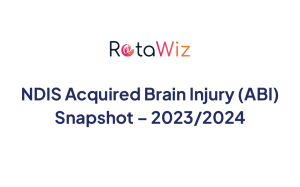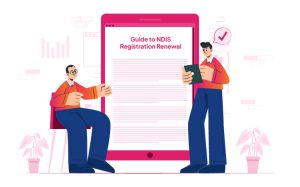5 November, 2024
The Future of SCHADS Award: What Changes Could Mean for Carers in the NDIS Sector in 2025
NDIS latest news
5 min read

As we approach 2025, the Australian social and community services sector is gearing up for impactful changes under the updated SCHADS Award (Social, Community, Home Care, and Disability Services Award). These adjustments, aimed at enhancing work conditions and pay structures for NDIS support workers and other social care professionals, will reshape industry standards. For carers in the NDIS sector, understanding these changes is essential, not just for compliance but for ensuring the best care delivery possible. This blog delves into the upcoming SCHADS Award 2025 changes, their implications, and how rostering software like RotaWiz can support NDIS providers in managing these updates.
What is the SCHADS Award, and Why Does it Matter?
The SCHADS Award sets out pay rates, working hours, and employment conditions for those employed in sectors like home care, disability services, and community support. Given the essential role these workers play in society, the SCHADS Award updates strive to ensure fair compensation, job security, and better working conditions. For NDIS providers and carers, this award affects everyday operations and long-term planning, making it crucial to stay up-to-date.

Key Changes to the SCHADS Award 2025
Minimum Engagement Period
From January 2025, casual and part-time workers will have a new minimum engagement period of two hours per shift. This applies to the employer rather than each participant, meaning NDIS providers cannot impose a minimum engagement time on the participants they serve. This rule ensures that carers are compensated for their availability, although providers must manage shift mallocations to avoid unnecessary participant charges. This change not only helps improve income stability for carers but also poses a scheduling challenge that requires efficient rostering solutions.
Compensation for Canceled Shifts
Under the new rules, employers can no longer withhold pay for shifts canceled on short notice. If an NDIS participant cancels a session, the provider must find an alternative shift for the worker or pay them for the scheduled time. This change is essential for ensuring income security for workers in this field.
Overtime and On-Call Allowances
Carers often face unanticipated tasks outside regular hours, such as emergency calls or short-notice roster changes. To address this, the award now includes higher overtime rates and specific on-call allowances for after-hours duties, making sure that carers are fairly compensated for all the work they perform. The rate varies significantly depending on the shift type and the level of SCHADS award pay they receive.
Broken Shift Allowance
Important Point: For those working in fragmented shifts, a new allowance compensates carers for broken shifts, especially in home care and disability services. This could mean extra pay for split shifts, which many workers undertake to accommodate client needs across the day. Specifically, the 2025 update mandates a 1.7% allowance for shifts with one unpaid break and a 2.25% allowance for two breaks within a 12-hour span. This change acknowledges the unpredictable schedules many carers face, especially in community services where multiple short shifts with the same or different clients can create fragmented workdays.
Remote Response Pay
A new “remote response” pay clause will ensure that workers are compensated for time spent working remotely or responding to emergencies outside scheduled hours. This protects NDIS carers who may have to attend to client needs after hours, ensuring fair pay for the work done outside regular duties.
The Impact on NDIS Support Worker Pay Rates
The SCHADS Award pay rates update will bring several new pay structures, including allowances for overtime, on-call shifts, and broken shifts. For example, SCHADS award pay rates include enhanced pay for specific shifts, like afternoon and night shifts, as well as public holiday work. This tiered system is intended to offer competitive compensation for the unique hours and flexibility NDIS support workers often provide, which is especially important as demand for NDIS services grows.
Navigating NDIS Price Guide 2024-25 and 2025
With these changes, it’s essential for NDIS providers to stay aligned with the NDIS Price Guide 2024-25 and the anticipated NDIS Price Guide 2025. These guides set the billing rates and clarify allowable charges for NDIS participants. Importantly, the SCHADS Award updates mean that any increase in NDIS support worker pay rates must remain fair, documented, and transparent to comply with the NDIS Code of Conduct.
How RotaWiz Can Help NDIS Providers Navigate These Changes
With SCHADS Award changes on the horizon, efficient rostering and payroll management are crucial. RotaWiz can simplify compliance with these updates through automated scheduling, payroll integration, and real-time tracking of worker shifts and allowances. RotaWiz’s platform is designed for NDIS support workers and providers, offering tools to manage broken shifts, track on-call hours, and ensure compliance with award requirements like minimum engagement periods.
Adapting to Change with the Right Tools
The SCHADS Award changes present both challenges and opportunities. With tools like RotaWiz, NDIS providers can adapt to these requirements while ensuring fair and transparent pay for workers. These updates underline a continued effort to support and protect carers, who are invaluable to the social and community services sector. Embracing these changes can not only benefit carers but also elevate the standard of care provided across the NDIS sector.

Imagine a world where disability services are readily accessible, customised to meet the needs of every individual, and supported by the latest technological advances. This objective has become a reality in Australia with the establishment of the National Disability Insurance Scheme (NDIS), which has completely changed how disability services are provided.
. . .


